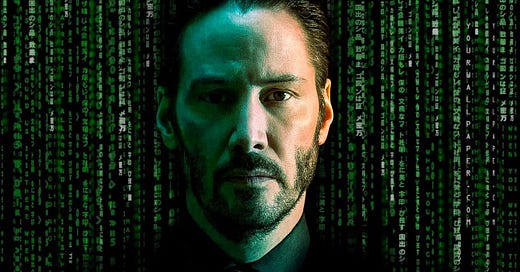Exploring the concept of "autonomy" in technology-enabled future:
a digest of thinking and works
Kelsie Nabben
10 December, 2021
I’ve been thinking a lot about the concept of “autonomy”. This post is an effort to synthesize some of these thoughts and link curious minds to various resources to read more.
When I first approached “Decentralised Autonomous Organisations” (DAOs) as a research site, it struck me; what do people mean by “autonomous”? It seemed like no one was talking about it.
In this blog post on “Experiments in Algorithmic Governance Continue: Trying not to fail at Decentralised Autonomous Organisations”, I point out that “one way to analyse DAOs is in terms of what is being organised, what is being decentralised, and who, or what, are being made autonomous? This includes whether autonomy is about individual autonomy, or collective autonomy, and what trade-offs are required to optimise for each.”
[Sourced from screenrant.com]
This investigation about individual and collective structuring arose again in the paper “Is a DAO a Panopticon?: Algorithmic governance as creating and mitigating vulnerabilities in DAOs”, in terms of who gets to set the rules of engagement in decentralised, digital communities, and what these means for resilient in DAOs. Here, I found my answer to a question I sometimes get asked, which is “Do you think DAOs will work?”. Thus far, my research has surfaced the insight that the greatest threat to DAOs, as well as the greatest opportunity, is DAOs themselves. They are internally generative human-machine assemblages that are adaptive, evolutionary, and alive.
Hundreds more hours engaging in research interviews, governance research calls, reading, thinking, and the dank corners of Discord kept me thinking on these themes of people, algorithms, and autonomous organisation.
Following a friendly retweet, Divya Siddarth and I connected, which led to a publication in Noema Magazine on tech futures and human autonomy. This lively exploration investigated different conceptions of autonomy in technology communities, namely, artificial intelligence, and cryptocurrency.
"The AI worldview prizes an autonomy of outcome with minimal active decision-making input, while its crypto counterpart desires an autonomy of process, with outcomes contingent on individual will and participation throughout the design of technological infrastructures. While the blockchain community holds decentralization as a core normative value, AI often pushes toward centralization as necessary for scale and safety.”
The goal of this piece for me was to explore evolutions in the concept of autonomy in cryptocurrency communities, and if and how this converges with AI.
That’s when I discovered Werner Dilger, and learned that the concept of “Decentralised Autonomous Organisation” was not new, and did not in fact emerge as a crypto-first concept. Dilger’s work was in the field of cybernetics and focused on artificial immune systems. The phrase “Decentralized Autonomous Organization” was first mentioned in the field of cybernetics to describe Intelligent Home technology as a complex, multi-agent system of algorithms that would operate like a living organism. Some practitioners in crypto have pointed out the obvious link between Web3 governance systems and cybernetics as the design and study of human-machine “steering” systems.
These findings are investigated in a working paper on “Imagining Human-Machine Futures: Blockchain-based 'Decentralized Autonomous Organizations’”, which explores autonomy in blockchain-based DAOs to investigate visions of algorithmic assemblages.
The conclusion to this recent paper is helpful to summarise my more recent thinking on the topic of people, autonomy, and Decentralised Autonomous Organisations.
“In this piece, I have sought to draw attention to the opaque blockchain framing of DACs and DAOs as organizations that achieve autonomy through governance by artificially intelligent algorithms, with humans at the margins. Some visions of DAOs in blockchain communities risk perpetuating the ideology of technological determinism and hopes of advancements in AI but are underformed and not clearly articulated or deliberated among these communities, although the capabilities don’t exist yet for this level of algorithmic governance.
I propose that this provides an opportunity to question, critically reflect on, and shape desired futures for an information age that promotes harmony between people and algorithms by emphasizing a state of autonomous individuals and wholes through Decentralized Autonomous Organizations presented in original articulations of “decentralized autonomous organizations” in the field of cybernetics. I explore the autopoietic properties of DAOs to self-generate, selfsustain, and self-reproduce by drawing on the case study example of “1Hive”. I argue that the field of cybernetics offers a more sophisticated articulation of autonomous organization in human-machine systems, which requires engineers to consider the role of people in guiding and shaping these socio-technical-political constructs towards autonomy.
In the end, our aspiration for autonomy, or “self-law” is as nuanced as people, in that it is both individual, and collective, and certainly cannot be left up to others to articulate for us.”
Acknowledgments:
This research does not occur in a vacuum. I’m ever grateful to each person who has contributed, including research interviewees and DAO communities, the team at RMIT University Blockchain Innovation Hub (especially Ellie Rennie, Chris Berg, Sinclair Davidson, and Jason Potts), Dr Michael Zargham and the team at Blockscience, Metagov, Smart Contract Research Forum, DAO Research Collective, and other collaborators along the way.




